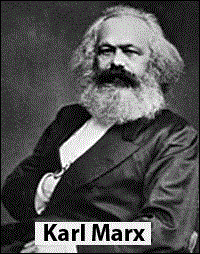Karl Marx – Biography
Karl Marx was a renowned German philosopher, sociologist, economist, and revolutionary thinker.

He was born on 5 May 1818 in Trier in Germany. He was the oldest son of Heinrich and Henriette Marx. He got his early education at a high school in Trier and matriculated in humanities in 1835. He earned a degree in law and philosophy from the University of Berlin in 1836. At the of 23 in 1841, he got a doctorate in philosophy from the University of Jena.
Most German universities, especially the Berlin university, at that time were under the influence of German philosopher Hegel and his proponents. The authorities of the universities deemed this dangerous for their universities because it was feared that Hegelian philosophy may make their students develop undesired political and atheistic orientations. For this reason, a few faculty members (including Bruno Bauer, a lecturer in theology) had also been expelled from some universities. Since Marx was also highly influenced by the Hegelian philosophy and was its staunch advocate, he could not get a chance to teach in German universities.
Marx initiated his professional career as a journalist for a newspaper the Rheinische Zeitung in 1842 and was promoted as its editor in the same year. However, this newspaper was suspended by the Prussian authorities soon because of Marx’s pronounced radical ideologies being regularly published in this newspaper which challenged the policies of the government. Marx was concerned about the problems of the exploited section of society and was openly encouraging them to revolt against the existing socio-political and economic order of society to replace it with a society based on socialism and communism. The Prussian government viewed it as a threat for it and thus closed the Rheinische Zeitung newspaper to suppress the voice of Karl Marx.
Marx married Jenny von Westphalen, a member of a noble Prussian family, in 1843. He along with his wife moved to Paris to find a relatively conducive environment for the expression of his revolutionary ideas. With this in mind, he started to publish German-French Yearbook in 1844 to present his ideas about Hegelian philosophy, socialism, and political economy.
In 1844, Marx met Fredrick Engels who became his close friend. Engels was a son of a textile manufacturer and had observed miserable circumstances of the factory worked which had made him a critic of the capitalist system, and thus, turned him into a social thinker. Marx was also a critic of the capitalist system, however, his exposure to Engels further enhanced his critical sense in relation to the capitalist system. Therefore, Marx and Engels started to write books and articles in collaboration. They wrote the famous books The Holy Family and The German Ideology in 1845. Before these books, Marx had also written The Economic and Philosophic Manuscripts of 1844which was published posthumously.
Marx and Engels remained great friends and collaborators. Engels also extended financial support to Marx so he can carry on working for his intellectual and political endeavors.
In 1845, Marx was forced to leave Paris when the German government asked the authorities in Paris to deport him because of Marx’s writings in support of the Silesian weaver’s uprising. Silesian weaver’s uprising took place in 1845 where the weavers revolted against the contractors who supplied them with raw material for weaving.
After Marx was expelled from Paris, he moved to Brussels, France. Engels also moved to Brussel in the same year to join his friend. Marx continued to express his radical ideologies and remained an active member of the international revolutionary movement. During his stay in Brussels, Marx met many leaders of the working-class movements which further enhanced his revolutionary spirit. In 1846, Marx and Engels established Communist Correspondence Committee in Brussels.
In 1847, Marx and Engels became members of the Communist League at the request of its representatives. From the platform of the Communist League, Marx published The Communist Manifesto of 1848. This short document used slogans to encourage people for revolution such as ‘workingmen of all countries, unite’. This document was widely viewed as ‘the birth certificate of socialism’. When the revolution initially broke out in France, Austria and Italy in 1848, Marx returned to Germany to achieve his revolutionary aim there. He wrote many articles to express his revolutionary ideas and to encourage people there for revolution. He was arrested by the government authorities and presented to a court for a trial. However, a kind-hearted jury acquitted him of the charges.
In 1849, he moved to London, England where spent the rest of his life. In England, he joined the Communist League and focused on observing industrial capitalism. He was highly hopeful that the economic crisis will soon prepare an environment for the eruption of a revolution. However, somewhat disheartened with the unsuccessful outcomes of his revolutionary efforts, his revolutionary spirit faded over time.
During his stay in London, Marx lived in miserable financial circumstances as he had to manage to survive on a meagre income from his writings. However, at this difficult time, his friend Engels provided him with some financial support.
In 1864, he set up International Working Men’s Association and gained popularity as its leader.
In 1867, he wrote and published the first volume of his most famous book Das Capital (The Capital). The other two volumes of this book were published posthumously. Marx devoted his life to the cause of exploited class (in the capitalist system) and carried out a war of ideas against the capitalists. These ideas of Marx are now collectively known as his famous theory of class conflict. The theory of class conflict draws its major insight from his book Das Kapital.
In the following period of his life, he suffered from a number of serious illnesses including bronchitis and pleurisy. Karl Marx died on 14 March 1883 in London and was buried in Highgate Cemetery.




